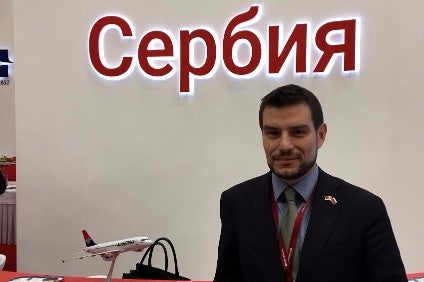
Serbian investment agencies say the country’s intensely competitive wage offering and availability of labour is the main reason why so many suppliers have flooded into the region.
Central and Eastern European countries are also enjoying a component manufacturer boom due to affordability, but are coming under increasing pressure as wages rise due to fierce competition for labour resources, something Serbia does not currently have.

Discover B2B Marketing That Performs
Combine business intelligence and editorial excellence to reach engaged professionals across 36 leading media platforms.
Despite the country struggling during the 1990s due to economic sanctions that were imposed on Serbia with automotive production slumping to around 20,000 vehicles per year, significant foreign direct investment involving 60 companies has totalled EUR1.7bn (US$1.9bn) and created more than 30,000 new jobs.
“The major requirement is to achieve price because the OEMs are pushing their suppliers on price,” Serbian Department for Realisation of Strategic Investments Automotive team leader, Vladimir Tomic told just-auto at last week’s St Petersburg International Economic Forum (SPIEF).
“Serbia had its share of economic problems in the 1990s, so today there is a pretty high level of unemployment. This gives an opportunity because automotive suppliers need a lot of workers – it is one of the [most] labour intensive industries we have [and] you can find the workers in Serbia.
“You can get them at a very affordable price. You can do that in Tunisia and Morocco as well but here you are much closer to your customers – Europe is where most of the automotive factories are. Take a look at this region: Southern Germany, Hungary, Czech Republic, maybe 70% of car production in Europe is being done there.
“Serbia is not part of the European Union, but it has a Free Trade Agreement with the EU, so you can import lots of product customs free.”
Belgrade also provides incentives to automotive companies including commercial grants and tax free holidays, while some municipalities offer plant at reduced prices or free of charge.
Serbia is equally the only country outside the Commonwealth of Independent States, which has a Free Trade Agreement with Russia.
“If you compare prices of the labour of Czech Republic, Slovakia and Serbia, it is maybe half the price of pay in Czech Republic; average net salary in Serbia is EUR360, added Tomic. “Countries like Czech Republic and Slovakia opened their borders for foreign companies during the 1990s and many came – these were excellent locations at that time but they became over-saturated.
“Companies over there took over each other’s workers, which they didn’t like because someone else offers them bigger salaries. Nothing like that is happening in Serbia at the moment. We take care to advise investors to place themselves in different cities, so they don’t compete for labour.
“There is such a thing called the Romania scenario – most companies went to to cities in the far West in Timisoara and [it] became overcrowded. We want to avoid this – in Serbia companies are really spread all over the country.
“In Serbia we have a good network of roads and where there are not, our government is investing a large amount of money into building roads. FCA sends cars by rail to Bar in Montenegro [while] there is also a port in Croatia called Rijeka and in Slovenia called Kopar, so these are the ports most usual, also Thessalonika in Greece.”
There are myriad suppliers in Serbia, such as Delphi, Magna, Grammer, Continental and Lear, while Michelin is the largest component producer and investor in the country, investing EUR400m and employing 3,000 staff.






